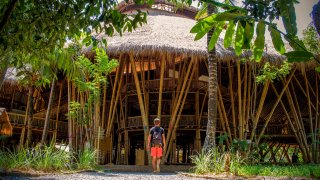
Nestled among palm trees in the hilly jungles of Bali, Indonesia, Green School International's bamboo structure and grass roof are right at home.
It might not look like your typical school. But then, it isn't supposed to. The environmentally-focused school is tearing up the standard syllabus, turning mainstream education on its head and raising an army of activist alumni as it goes.
Still, any student is sure to recognize a few things. The school's head of curriculum insists on early starts, daily timetables, homework books — all recycled, naturally.
"The first thing to say is we're not out hugging trees all day," Chris Edwards told CNBC Make It. "A person at Green School would be familiar with many parts of the day."
Get Tri-state area news and weather forecasts to your inbox. Sign up for NBC New York newsletters.
Reinventing mainstream education
Green School International (GSI) is a network of eco-friendly, private international schools attempting to reinvent traditional schooling for 21st-century students.
Launched in 2008 in Ubud, Bali, Green School today spans Indonesia, New Zealand and South Africa with its "holistic" approach to education.
"When we started the school, we had no idea what we were doing. But we were pretty adamant we wanted to do something different," said co-founders John and Cynthia Hardy.
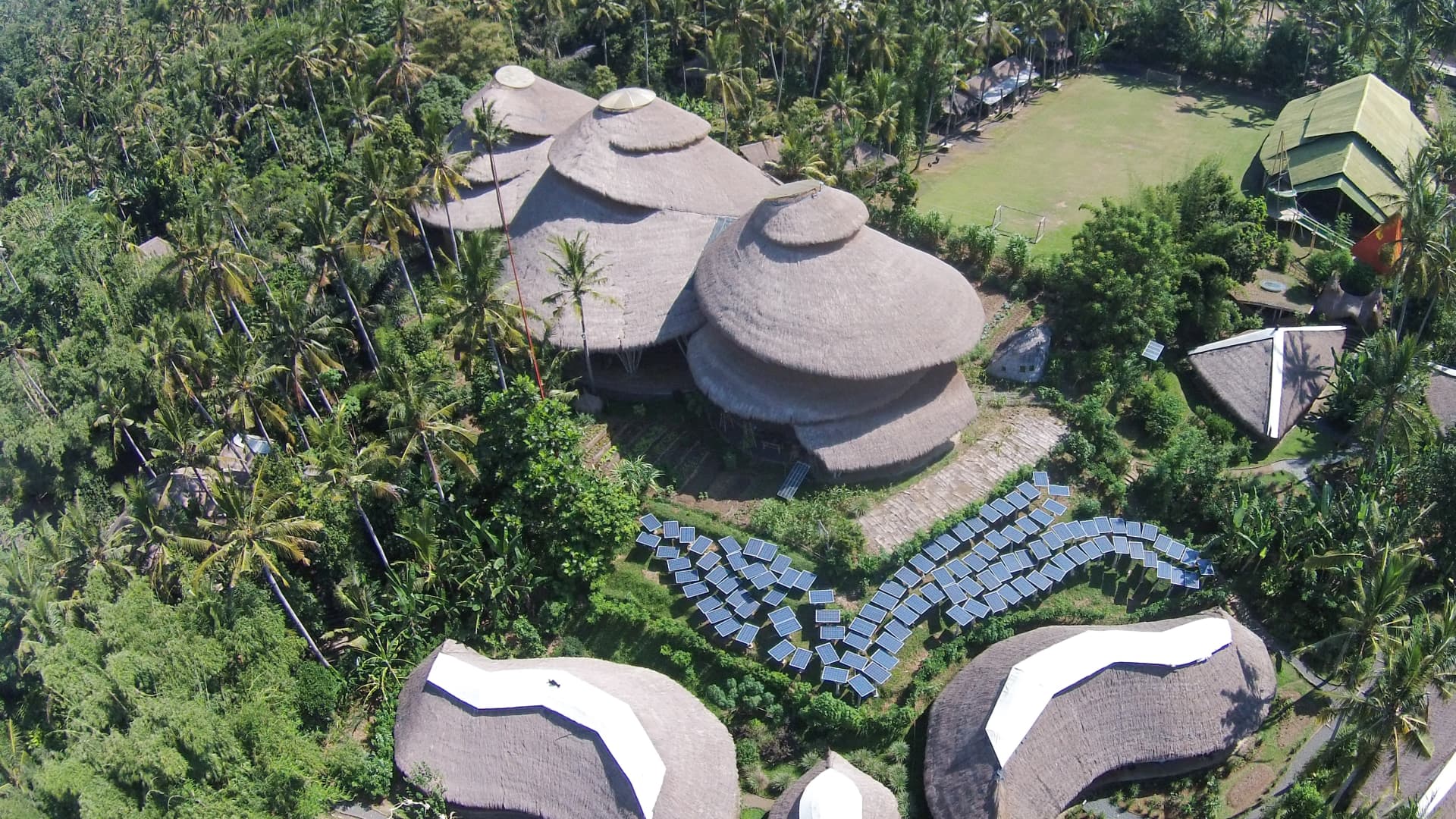
Growing up in Canada with learning difficulties, John was disillusioned by mainstream education from a young age and saw it as too regimented. So when it came to choosing a school for their daughters, the North American couple decided to break the mold and create their own.
Money Report
"We wanted to create a holistic educational experience, combining the mental and the physical and the emotional," they said.
With approval from the Indonesian authorities, in 2006 they set to work to build a sustainably sourced, indoor-outdoor structure with the proceeds from the sale of their Bali-based jewelry business. As an independent, fee-paying school charging between $10,000 a year for kindergarteners and $20,000 for high schoolers, they have been reinvesting to grow the school since.
Tearing up the school book
Building an environmental school was one thing, but creating a new, progressive syllabus was another.
"Over the years, we have been building Green School's own solid curriculum," said Cynthia, noting that the school is accredited by the Western Association of Schools and Colleges.
While Green SchooI teaches traditional subjects like math, science and language, it also draws on alternative approaches such as Steiner and Montessori, which emphasize creativity and self-direction. But more than that, it aims to educate children about modern global problems, and prepare them for it.
"We sat down and said: What are the 10 most important issues right now?" said Edwards, Green School's head of curriculum, who led the school's expansion in Taranaki, New Zealand.
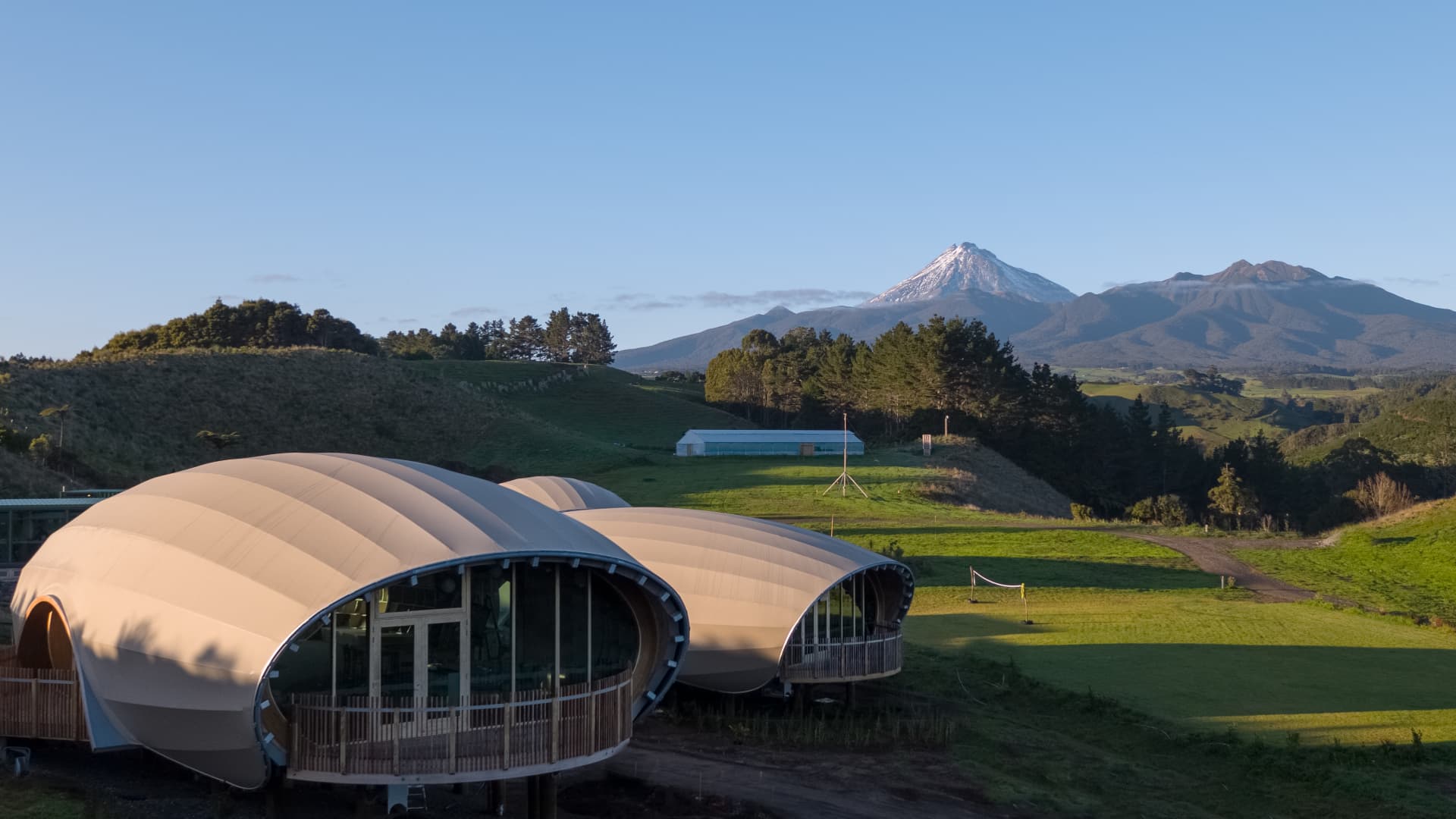
Central to that approach is the Green School compass, which follows the acronym "R.E.A.L."
- Relational — All subjects are better taught in relation to the real-life environment.
- Experiential — Don't talk about it, do it.
- Action-oriented — Rather than seeing education as a preparation for life, education is treated as part of living.
- Local to global — If you can't solve a problem in your own domain, don't preach to others about it.
Meantime, the syllabus also features annual "Greenstone projects," giving students the opportunity to devise business plans and work with local communities to address current challenges like climate change and inequality.
"We're actually addressing what we think are the biggest issues of our time," he continued. "Because we're new, we can say we're developing our curriculum around the U.N. sustainable development goals."
Raising world-class students
In the 13 years since launch, Green School Bali has raised a gamut of notable alumni hailing from across the globe.
Chief among them, perhaps, are Dutch-Indonesian youth activists Melati and Isabel Wijsen. The sisters shot to fame when they were 12 and 10, respectively, with a campaign to rid their hometown, Bali, of plastic bags.
Their Bye Bye Plastic Bags initiative ultimately resulted in an islandwide ban and is now a global movement spanning 20 countries and placing them on the world stage from TED Talks to the United Nations and the World Economic Forum.
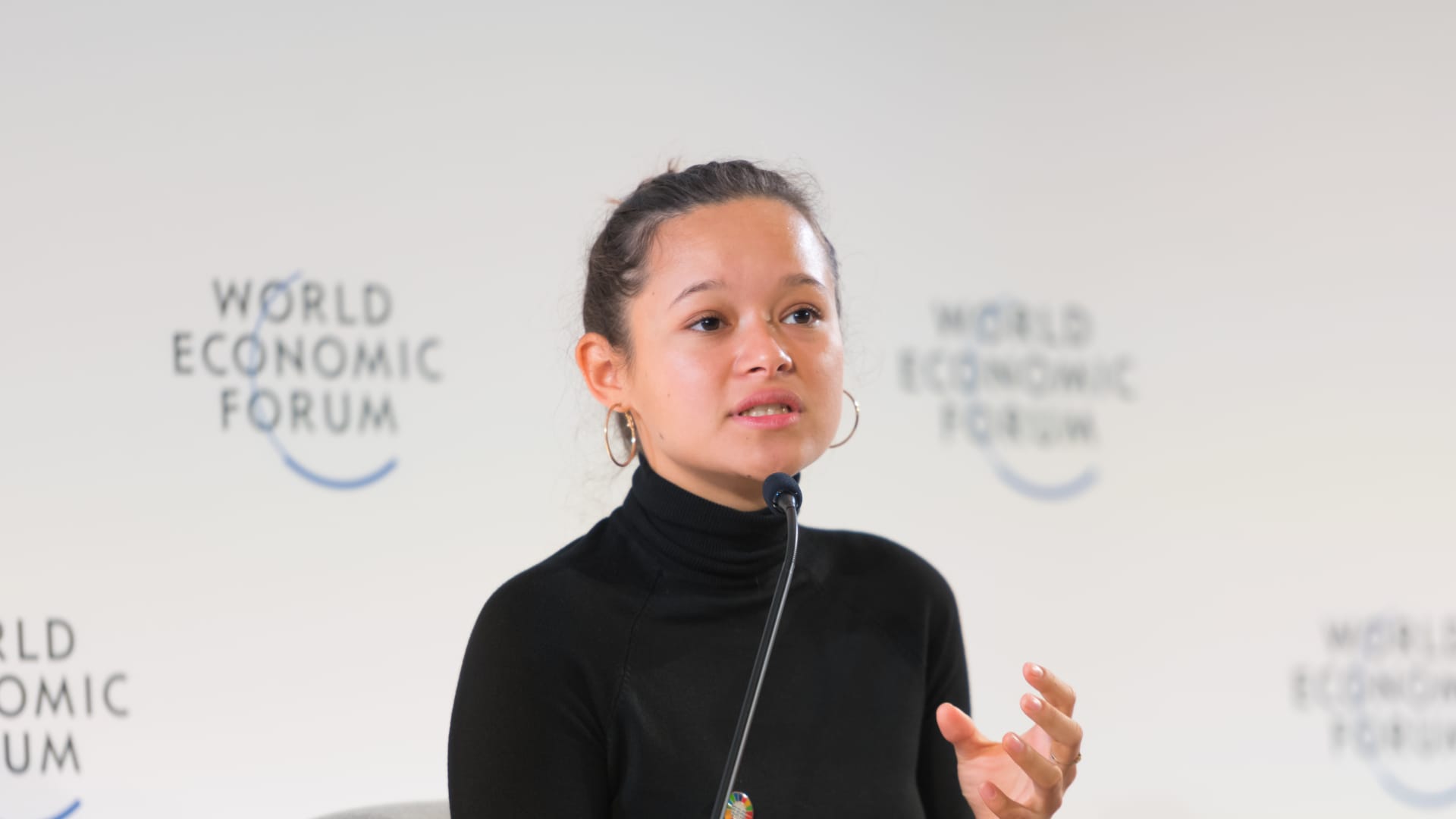
And they're not alone.
Climate campaigner Clover Hogan is an advisor on global warming in the boardrooms of Fortune 500 companies. Entrepreneur Nicholas Saye produces an independent line of sustainable accessories.
Another Green School alumni Isami Said Rashid tours with his band from Tanzania to the U.S. to raise awareness for Borneo's burning rainforests.
Meanwhile, local scholarship student Teshalonika Krisanti leads a school teaching English to underprivileged children.
"They're strong-minded kids, they're activists," said Cynthia. Overall, 36 of Green SchooI's graduates have gone on to speak at global U.N. conferences and seven have presented TED or TEDx Talks.
Growing from the grassroots
Last month, Green School International opened its third branch, this time in South Africa Western Cape province.
The school is the passion project of the Brandt family, former attendees who said their experience at Green School International Bali "fundamentally changed how we see education."
At launch, the school enrolled more than 100 students, the majority of whom were locals with some pupils from Europe and Japan.
"Given the impact of Covid, it has been very encouraging," said Andy Wood, the head of school for South Africa. He added that the pandemic had given parents cause to "rethink their idea of education."
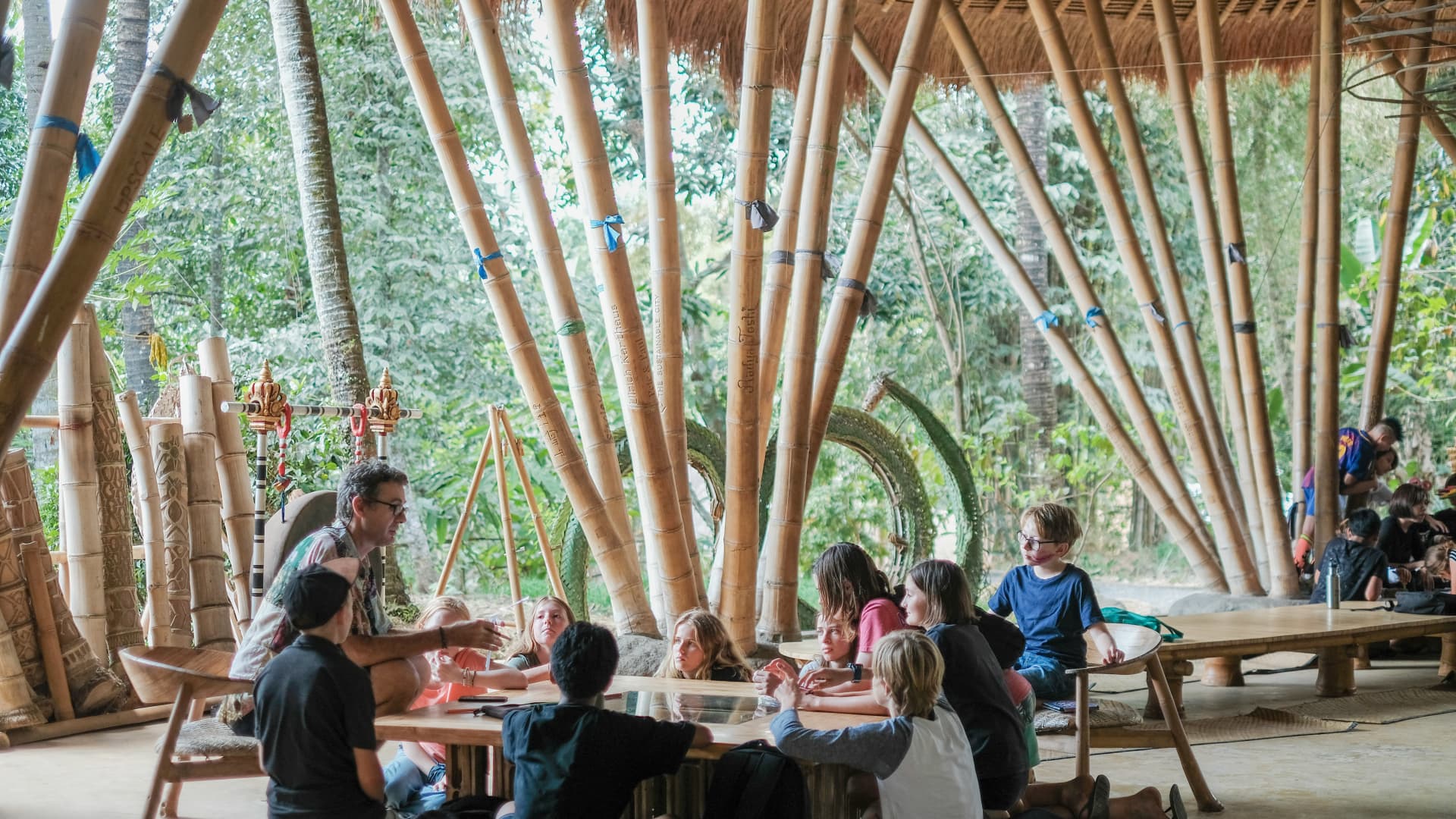
Like GSI's other arms, Wood said the school also plans to raise scholarship and bursary funds for underprivileged local children. South Africa is marred by one of the world's highest dropout rates for school students, with just over one-fifth (22%) of enrolled students making it to higher education.
"We want to teach people how to graduate," said Wood, highlighting the need to emphasize time-management and commitment, as well as practical skills. "A major part of your success at school and university is learning how you learn and how you're successful. That, we think, will be exciting for universities."
Expanding to new environments
As Green School continues its expansion, including a new arm in Tulum, Mexico later this year, how it translates to other, more urban environments remains to be seen.
Still, Edwards, the head of curriculum, is confident that the school's alternative approach could take off.
"What we're teaching is not rooted to an environment," he said. "The Green School way of education should become the norm sooner rather than later, which means Green School and the like in urban areas, like New Delhi and the U.K.," he said, noting the wide-reaching need for environmental solutions.
Indeed, the Hardys say their vision is now catching the eye of other institutions and universities are now coming to them for out-of-the-box thinkers.
"Schools (universities) are taking more time to look at the child and what they stand for," they said. "They're now coming to us to recruit."
Don't miss: How 3 friends made a multibillion-dollar business of Indonesia's street stalls
Like this story? Subscribe to CNBC Make It on YouTube!






